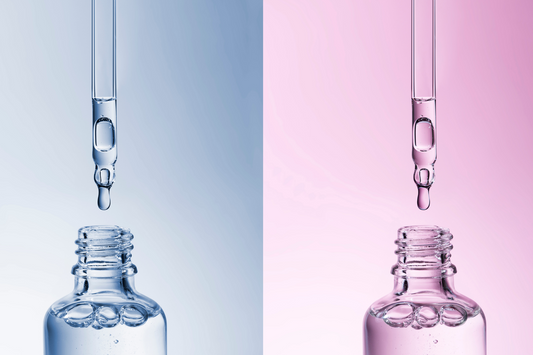If you’ve been looking for healthy or natural ways to promote hair growth, you might have come across magnesium as a solution–so you might be wondering, is magnesium good for hair growth? This article explores if magnesium is good for hair growth and why magnesium can be good for hair growth, in addition to other effective methods for hair growth.
So, is it true that magnesium is good for hair growth?
The short answer is yes (mostly), magnesium is good for hair growth! It is an essential supporting ingredient, but it won’t directly cause your hair to grow back. So peppering your scalp with magnesium won’t get the job done. That being said, while magnesium won’t directly cause your hair to grow, it is an important part of your diet and is beneficial for hair growth overall for the following reasons:
Prevents calcium buildup
One of the reasons that magnesium is good for hair growth is because it helps to prevent calcium from building up in your scalp in a process called scalp calcification. Calcium is a hardening mineral. It builds up on the scalp after blood vessels in the scalp begin to accumulate calcium in their walls. Because of this buildup, the vessels become stiff, inflexible, and can no longer give your scalp the circulation it needs for hair follicles to grow! Once this happens, hair can begin to shed. This phenomenon has been studied in rats, who had large levels of calcium in their blood and experienced negative effects to their hair follicle health.
Another way that scalp calcification can occur is if you regularly shower with hard water, or any water from an underground source. Water is considered harder if it contains more dissolved minerals, and the hardness of water varies by region. Hard water can contain large amounts of calcium, which can in turn build up on your scalp even if you don’t have high calcium levels in the blood.
Magnesium is good for hair growth because it counteracts calcium and its effects, ensuring that your hair is healthy and the blood vessels in your scalp maintain the circulation that it needs to allow hair growth. Not only does magnesium help to unclog your hair follicle pores, but by limiting scalp calcification, it makes sure that the calcium travels through the bloodstream to the places where it is needed, such as the bones or teeth. So, not only is magnesium good for hair growth, but it can also, although indirectly, help with bone strength!
Fighting stress
As we’ve discussed before, telogen effluvium is a common, stress-induced form of hair loss. Magnesium is good for hair growth and telogen effluvium specifically because it can help lower your body’s levels of the stress hormone, cortisol. Studies have shown that magnesium deficiency can play a role in anxiety disorder. Magnesium is good for hair growth because it is heavily involved in your brain’s health; it helps to lower stress by blocking neurotransmitters for hormones that are involved in excitement and stress, such as cortisol, and enabling you to relax. It’s also proven to play a role in the Hypothalamic-Pituitary-Adrenal (HPA) axis, your body’s system for stress management through hormones. So not only is magnesium good for hair growth, but it could also make you feel calmer!
Getting more magnesium in your diet
While magnesium will not directly increase hair growth, it is important to maintain the right diet to prevent a magnesium deficiency in your body. Here are some foods that are rich in magnesium:
- Roasted pumpkin seeds
- Whole grains
- Chia seeds
- Spinach and other dark green leafy vegetables, like kale
- Dried beans
- Legumes
- Almonds
How to keep your hair healthy and promote hair growth
It’s clear that magnesium is a good for hair growth and hair health, but it is also helpful for your hair’s health to practice other healthy habits and lifestyle changes to support hair growth in conjunction with magnesium. Maintaining a healthy, well-balanced diet provides the foundation your hair needs for growth. Here are some things you can do to support hair growth:
- Eating proteins: Your hair is made of protein, so naturally, a protein deficiency will prevent your hair from growing normally. Foods rich in proteins include eggs, lean meats like beef and pork, nuts and seeds, tofu, and beans.
- Decreasing alcohol consumption: Alcohol slows down your liver from absorbing the nutrients your body (and your hair) needs to thrive. Even if you are consuming more magnesium, a high alcohol consumption can undo all your hard work! If you regularly consume alcohol, consider decreasing your alcohol intake.
- Avoiding heat and other chemical treatments: The NIH linked heat and chemical treatments such as dying and perming to increased hair loss. If you’d like to promote hair growth on your scalp, consider avoiding these treatments.
Conclusion
It turns out that magnesium is a key supporting ingredient for hair growth. While it won’t directly cause your hair to grow back, it is good for hair growth because it is a key nutrient that supports brain health and prevents calcium buildup on the scalp.
If you are looking into magnesium because you are experiencing hair loss, consider a targeted topical serum like Revela’s Hair Revival Serum! Unlike magnesium, which supports hair growth, ProCelinyl, the breakthrough ingredient in Revela’s Hair Revival Serum “reawakens” dormant hair follicles to directly improve their health and stop hair loss in its tracks.
Sources
- https://ninaross.co/blogs/health-wellness-posts/magnesium-hair-growth
- https://www.hairguard.com/scalp-calcification/
- https://www.ncbi.nlm.nih.gov/pmc/articles/PMC4828511/
- https://edit.sundayriley.com/benefits-of-magnesium/
- https://www.usgs.gov/special-topics/water-science-school/science/hardness-water
- https://www.sciencedirect.com/science/article/pii/S0028390811003054?via%3Dihub
- https://www.viviscal.com/hair-care/magnesium-for-hair-growth
- https://www.healthline.com/health/what-makes-hair-grow
- https://www.chandramd.com/blog/magnesium-deficiency-anxiety
- https://ods.od.nih.gov/factsheets/Magnesium-HealthProfessional/
- https://my.clevelandclinic.org/health/articles/15650-magnesium-rich-food





